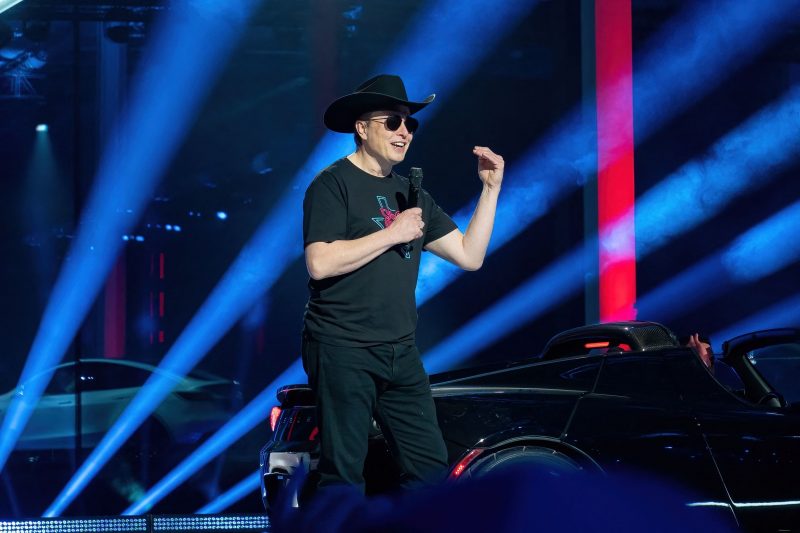When you take just a step or two back, the picture isn’t that complicated. A billionaire business executive who has given to both Democratic and Republican candidates begins to make clear that his personal politics lean more heavily to the right. This seems in part to be a function of the media environment in which he operates. It is clearly exacerbated, too, by frustration at critical reporting from traditional news outlets.
The next thing you know, he’s sharing overtly right-wing content and cocooning himself in a universe of allies — even to the detriment of his own credibility. Once just a rich celebrity, suddenly the guy is a central component of a political movement. And leaning into it.
So it was that Donald Trump became president.
Oh, did you think I was talking about Elon Musk? Well, yeah, I was. That carefully articulated outline of behavior applies to both men by design. But that doesn’t mean that the parallels are contrived. Musk’s willing step into the spotlight has left little doubt about his current political inclinations, just as Trump’s 2016 presidential campaign made very clear — if more explicitly — where he stood.
This is worth mentioning because of a column published by the New York Times over the weekend. In it, Jeremy Peters notes that Musk’s politics can be hard to categorize, in large part because his discussions of politics tend to occur within the context of Twitter, the social media site he owns, and in part because of Musk’s political history. Is it safe to say that a guy who has given to Democratic candidates and insists he’s voted Democratic in the past and may again in the future is antithetical to the Democratic Party?
The answer is yes, for several reasons.
The first is that the contribution patterns of wealthy business executives should probably not be treated as clear indicators of their own ideologies. Giving the maximum allowable contribution to every candidate in every House and Senate race will cost you less than $3 million, money that, for a multibillionaire, is chicken scratch. Business executives admit regularly that they give to both parties to advance their interests; it was actually a central part of Trump’s shtick in 2016!
Then, of course, there’s the difference between politics and partisanship. In 2004, Trump said that he identified more as a Democrat than a Republican. Until 2008, in fact, he was registered as a Democrat — after having switched to the party from being an independent, after having been a Republican. This partisan history did not end up being a good guide to his politics.
In the months since Musk took over Twitter, he’s been more overt about both his partisanship and his politics. He’s said he would support Florida Gov. Ron DeSantis (R) in a potential 2024 presidential bid and encouraged Twitter users to vote Republican in the midterm elections as a purported counterweight to the left.
But that’s fundamentally less important than the political rhetoric he has embraced and amplified. His purchase of Twitter — a commitment, it’s worth remembering, that he tried quite hard to wriggle out of — has allowed him to occupy a much larger share of the public (and “elite”) conversation than he used to. And as he’s done so, he’s aligned both directly and indirectly with right-wing voices and arguments.
Peters walks through this at length, a recitation that by itself largely answers any questions about where Musk stands politically. That he’s engaged repeatedly with fringe actors like Mike Cernovich and “Cat Turd” and has sought to weaken the standing of traditional journalists are indirect manifestations. His repeated insistences that the left is becoming toxic are direct ones.
Then there are comments like these, published after Peters’s piece.
My pronouns are Prosecute/Fauci
— Elon Musk (@elonmusk) December 11, 2022
He went on to explain why he chose the twin targets of that tweet: that “forcing your pronouns upon others” is bad and that Anthony S. Fauci, the nation’s leading infectious-disease expert, was complicit in the spread of the coronavirus — unproven allegations that are common as right-wing points of attack against the epidemiologist villainized by Trump.
Musk has framed his purchase of Twitter itself as an effort to fight on behalf of free speech against the “woke mind virus,” a rationalization for the reluctant purchase that diverges from his stated reason when he first launched his bid to buy the company: spam from automated accounts.
Here, too, politics intrudes. The right has long argued that it was being unfairly targeted by social media platforms, Twitter specifically, on ideological grounds. Musk has embraced that argument, using his new stewardship of the platform to pass internal documents to sympathetic writers to present the case that Twitter had acted unfairly against the right. They have obliged, putting together multipart Twitter threads purporting to show how the platform went after right-wing actors, Trump included.
The reality that’s emerged from the “Twitter Files” releases, as Musk has framed them, is no different than the reality that preceded their release: The platform had a glitchy, subjective process for assessing high-profile accounts but that there’s no evidence efforts to reduce the reach of certain accounts was spurred by political ideology. Musk and his allies have insisted that this ideological bias has been proven by the releases, itself mirroring the behavior of Trump and his supporters: If you insist hard enough, the facts become what you want them to be.
There’s an underrecognized point here. Consider why Musk posted that “Prosecute/Fauci” thing. He wants engagement by stirring up controversy, certainly, as well as to present views that contrast with the left-wing “mind virus.” But he’s doing so by trolling, by intentionally trying to irritate people.
This, at its heart, was what Twitter began to crack down on in the wake of the 2016 election and what led to the sense that the right was being unfairly targeted. Twitter implemented new, public policies that limited the reach of people whose accounts had repeatedly been flagged as abusive. This affected a lot of users whose preferred style of using the service was to try to irritate the actual or perceived left. Trolling and “lib-owning” had become central tactics of the online right. Twitter was not cracking down on right-wing accounts because they were right wing, in other words, but in part because right-wing accounts often engaged in activity that increased the toxicity Twitter was trying to stamp out. It wasn’t the politics but the practices.
In the case of Musk’s Fauci tweet, the medium was also the message.
His pledge to reinstate those whose accounts had been frozen by Twitter in the Before Times promised to simply reinject that toxicity into the platform. Outsiders making objective observations about how the platform worked — the same group that accurately predicted how Musk’s verification scheme would collapse — suggested that many of those reinstated would simply violate the platform’s terms again and test Musk’s tolerance for abuse. (See: Ye.) We shall see.
To Musk, though, this is itself a statement of politics. This group, he feels, was overwhelmingly right leaning, and he is welcoming them back. He thinks their voices were unfairly muffled and demand to be heard, something that he frames inaccurately as being derived from the First Amendment. He is sympathetic here because he largely agrees with what they were saying and how they were saying it.
Elon Musk is right wing. He has tried hard to make that very clear.








